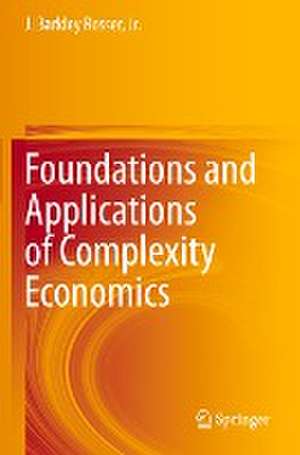Foundations and Applications of Complexity Economics
Autor J. Barkley Rosser, Jr.en Limba Engleză Paperback – 23 mai 2022
The book begins with a full account of the broader categories of complexity in economics--dynamic, computational, hierarchical, and structural--before shifting to more detailed analysis. The next two chapters address problems associated with computational complexity, especially those of computability, and discuss the Godel Incompleteness Theorem with a focus on reflexivity. The middle chapters discuss the relationship between entropy, econophysics, evolution, and economic complexity, respectively, with applications in urban and regional dynamics, ecological economics, general equilibrium theory, as well as financial market dynamics. The final chapter works to bring together these themes into a broader framework and expose some of the limits concerning analysis of deeper foundational issues.
With applications in all disciplines characterized by interconnected nonlinear adaptive systems, this book is appropriate for graduate students, professors and practitioners in economics and related disciplines such as regional science, mathematics, physics, biology, environmental sciences, philosophy, and psychology.
| Toate formatele și edițiile | Preț | Express |
|---|---|---|
| Paperback (1) | 635.01 lei 6-8 săpt. | |
| Springer International Publishing – 23 mai 2022 | 635.01 lei 6-8 săpt. | |
| Hardback (1) | 641.20 lei 6-8 săpt. | |
| Springer International Publishing – 22 mai 2021 | 641.20 lei 6-8 săpt. |
Preț: 635.01 lei
Preț vechi: 747.06 lei
-15% Nou
Puncte Express: 953
Preț estimativ în valută:
121.51€ • 127.45$ • 101.15£
121.51€ • 127.45$ • 101.15£
Carte tipărită la comandă
Livrare economică 01-15 aprilie
Preluare comenzi: 021 569.72.76
Specificații
ISBN-13: 9783030706708
ISBN-10: 3030706702
Ilustrații: IX, 174 p. 16 illus., 5 illus. in color.
Dimensiuni: 155 x 235 mm
Greutate: 0.27 kg
Ediția:1st ed. 2021
Editura: Springer International Publishing
Colecția Springer
Locul publicării:Cham, Switzerland
ISBN-10: 3030706702
Ilustrații: IX, 174 p. 16 illus., 5 illus. in color.
Dimensiuni: 155 x 235 mm
Greutate: 0.27 kg
Ediția:1st ed. 2021
Editura: Springer International Publishing
Colecția Springer
Locul publicării:Cham, Switzerland
Cuprins
Chapter 1: Logical and Philosophical Foundations of Complexity.- Chapter 2: Foundations of Complex Behavioral Economics.- Chapter 3: The Complex Dynamics of Social Interactions.- Chapter 4: Econophysics, Entropy, and Complexity.- Chapter 5: Econophysics and Entropy in Dynamically Complex Urban/Regional Systems.- Chapter 6: Complex Ecological-Economic Systems and their Governance Issues.- Chapter 7: Complexity and the Future of Economics.- Bibliography.
Notă biografică
John Barkley Rosser Jr. is a mathematical economist and Professor of Economics at James Madison University in Harrisonburg, Virginia, US. He is known for work in nonlinear economic dynamics, including applications in economics of catastrophe theory, chaos theory, and complexity theory. He joined the economics department at JMU in 1977, and was appointed Professor of Economics in 1988 and Kirby L. Cramer Jr. Professor Business Administration in 1996. He has published several books and over 200 journal articles, book chapters, and book reviews in a wide variety of sub-fields of economics. He served as Editor of the Journal of Economic Behavior and Organization from 2001–2010. In 2012 he became Founding Editor-in-Chief of the Review of Behavioral Economics. As of 2018, he is also Coeditor of the New Palgrave Dictionary of Economics, 4th edition.
Textul de pe ultima copertă
This book presents a survey of the aspects of economic complexity, with a focus on foundational, interdisciplinary ideas. The long-awaited follow up to his 2011 volume Complex Evolutionary Dynamics in Urban-Regional and Ecologic-Economic Systems: From Catastrophe to Chaos and Beyond, this volume draws together the threads of Rosser’s earlier work on complexity theory and its wide applications in economics and an expanded list of related disciplines.
The book begins with a full account of the broader categories of complexity in economics--dynamic, computational, hierarchical, and structural--before shifting to more detailed analysis. The next two chapters address problems associated with computational complexity, especially those of computability, and discuss the Godel Incompleteness Theorem with a focus on reflexivity. The middle chapters discuss the relationship between entropy, econophysics, evolution, and economic complexity, respectively, with applications in urban and regional dynamics, ecological economics, general equilibrium theory, as well as financial market dynamics. The final chapter works to bring together these themes into a broader framework and expose some of the limits concerning analysis of deeper foundational issues.
With applications in all disciplines characterized by interconnected nonlinear adaptive systems, this book is appropriate for graduate students, professors and practitioners in economics and related disciplines such as regional science, mathematics, physics, biology, environmental sciences, philosophy, and psychology.
The book begins with a full account of the broader categories of complexity in economics--dynamic, computational, hierarchical, and structural--before shifting to more detailed analysis. The next two chapters address problems associated with computational complexity, especially those of computability, and discuss the Godel Incompleteness Theorem with a focus on reflexivity. The middle chapters discuss the relationship between entropy, econophysics, evolution, and economic complexity, respectively, with applications in urban and regional dynamics, ecological economics, general equilibrium theory, as well as financial market dynamics. The final chapter works to bring together these themes into a broader framework and expose some of the limits concerning analysis of deeper foundational issues.
With applications in all disciplines characterized by interconnected nonlinear adaptive systems, this book is appropriate for graduate students, professors and practitioners in economics and related disciplines such as regional science, mathematics, physics, biology, environmental sciences, philosophy, and psychology.
Caracteristici
Presents a survey of the aspects of economic complexity, with a focus on foundational, interdisciplinary ideas Provides applications in urban and regional dynamics, ecological economics, general equilibrium theory, and financial market dynamics Draws various themes together in a broad, transdisciplinary framework through which to view complexity
